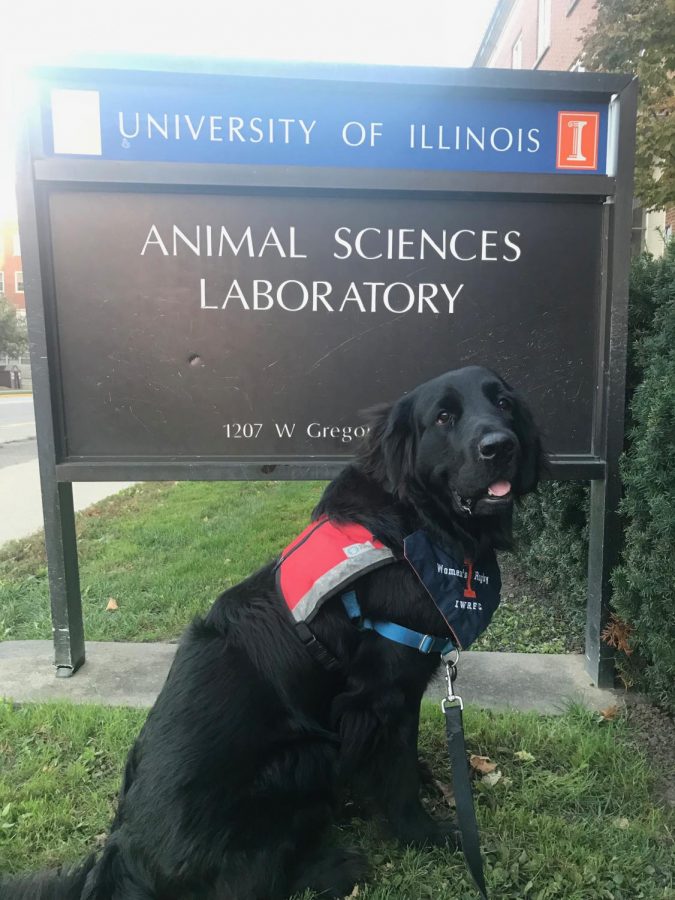Students join 4 Paws for Ability to help train service dogs at Illinois
Chipotle is a recent graduate of the 4 Paws for Ability service dog training program. Photo Courtesy of 4 Paws.
February 7, 2019
Lizzy Geary, junior in ACES, fosters a dog named Froggy on Tuesdays and Thursdays. She shares responsibility of Froggy with other students who work to foster and train service dogs for the nonprofit organization 4 Paws for Ability.
The group provides service dogs to people in need of assistance, such as war veterans and children with disabilities. Their main mission is to increase the number of service dogs available for those who need them.
The organization partners with the University through their foster program, which allows students on campus to foster and train dogs to become service animals. The University is one of 14 universities which has partnered with 4 Paws. In the spring 2017 semester, 4 Paws for Ability officially became an RSO on campus.
“It’s just amazing to see how much time people are willing to dedicate to these dogs,” Geary said.
Geary said many people not only dedicate their time to foster these dogs, but they also help with the work 4 Paws does for the animals and their future owners.
Get The Daily Illini in your inbox!
A base in Ohio supplies these dogs to 4 Paws when they are 3 to 5 months old. Fostering one of these dogs is a lengthy process.
First, members must apply to be a part of the organization. The application ensures individuals are suitable and committed to fostering a dog. They also check that the person lives in housing that allows pets. Members must then drive to Ohio for the orientation that teaches members how to train these animals as service dogs.
“It is so rewarding to be able to assist these dogs in the training that could eventually help them improve someone’s quality of life,” said Averie Anderson, junior in ACES and vice president of 4 Paws.
The training process teaches the rules behind the fostering and training to become a service dog. For the dogs, this includes learning how to behave in public, how to recognize if the owner needs help, and about 20 different commands.
Not all members of 4 Paws are required to foster dogs. Some people choose to puppy sit instead. Puppy sitters learn all the training requirements as well, but do not have their own dogs. They watch and take care of the dog if its foster is unable to.
People in any living situation, including residence halls, are allowed to puppy sit since they are not solely responsible and just commit to the animals for certain amounts of time.
Throughout training, the dogs are evaluated to see if they are fit to become service dogs and if their training has been effective. Not all dogs are cut out to be a service animal, and some end up being put up for adoption instead. But, most dogs finish training, continuing on to more advanced training which is tailored to the individual they will be serving.
“The coolest part about our club is being able to spread awareness about the importance of service dogs,” said Katie Erley, senior in ACES and another member of 4 Paws.
The time it takes to foster a dog varies based on how quickly the dog is trained. Most people fostering get their dog at the start of any semester, but they can still take care of them during breaks from school. Most dogs finish their training within two years. If a student isn’t able to be with a dog throughout their whole training, it will go to another willing foster.
“It’s the best thing I’ve ever done,” Geary said while reflecting on her first time fostering a dog.
The owners of her first service dog contacted Geary to tell her how grateful they were to have the dog because it has impacted their lives so much. This interaction encouraged Geary to continue fostering and train service dogs.
Erley said it is always interesting to walk around campus because she knows that she will be greeted with the excited gasps of fellow college students.
“Everyone would walk up to me and say hello, or just ask about my dog and it was fun to meet so many different people on campus,” Erley said.
Besides fostering and training the dogs, 4 Paws has meetings once a week where members go over presentations that promote awareness about the organizations activities and service dogs in general.
“It is really fun to be in an RSO where everyone in the club cares about dogs as much as I do,” Anderson said.







